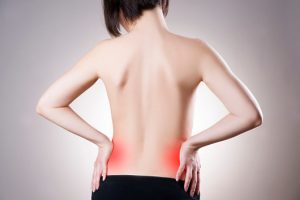
If you are experiencing pain on the outside of your hip or in the surrounding area, it may be due to problems in the ligaments, tendons, muscles, and soft tissues surrounding the hips. If the pain is on the inside of the hip, you may have a problem with the actual hip joint.
Symptoms of hip pain in women
The symptoms you experience will differ depending on the cause of your hip pain, but some of the more common symptoms are discomfort and pain in your thigh, groin, buttocks, and the inside or outside of the hip joint. If you have back pain, that could also radiate to your hip.
People suffering from chronic hip pain report having a reduced range of motion and some even have a limp.
Common causes of hip pain in women
Many causes of hip pain really depend on your age, but below is a list of some of the most common causes:
Arthritis: This is the most common cause of chronic hip pain in women. Osteoarthritis—the wear-and-tear type of arthritis that occurs naturally—is particularly prevalent in women. The pain often hits the groin or the front of your thigh.
Gynecological and back issues: It’s important to not assume that all hip pain is caused by arthritis, especially in women. Hip pain can result from gynecological causes. Endometriosis—a condition in which endometrial tissue appears outside of the uterus—can cause pelvic pain, which is often described as hip pain.
Hernia: Femoral and inguinal hernias may cause frontal hip pain in women. If you are pregnant, you are more likely to have an inguinal hernia due to the pressure on your abdomen.
Hip fractures: Older women often experience hip fractures, especially if they have osteoporosis. If you have a hip fracture, you may experience pain when you use your leg, particularly when you straighten, lift, or stand on it. A sign that you have a hip fracture is if the toes on your injured side turn outwards.
Tendinitis and bursitis: Tendons easily get inflamed due to overuse and stress (and there are a lot of tendons around the hip). Known as tendinitis, this condition often causes hip pain. In addition to tendinitis, bursitis also causes hip pain. Bursitis is when the bursae—fluid-filled sacs that cushion the hip—become inflames from overuse or irritation. It can cause pain when you move your hip.
Diagnosis of hip pain
Hip pain is often misdiagnosed—you may think you have pain in your hip when really the pain is coming from elsewhere. So, the first thing a doctor should do is make absolutely sure that the pain is actually coming from your hip, rather than the thigh or buttock.
How to get hip pain relief
Here are some of the best ways to relieve your hip pain:
RICE (Rest, Ice, Compression, Elevation): Rest is necessary to give anything that is strained or bruised time to heal. It is one of the best natural methods to reducing swelling and irritation. All you need to do is avoid activities that cause pain. Ice is also a good method to relieve swelling and pain, and you only need to put it on the area that is hurting. Ice provides short-term relief as it reduces the constriction of blood vessels.
By compression we mean that you can wrap the hip area with bandage, which relieves swelling and pain. Lastly, elevation is good to do the same thing, and is as easy as raising the hips by reclining your feet.
Low-impact exercises: Exercises are good for strengthening your hips and for improving flexibility. You don’t have to do strenuous exercise; in fact, we recommend that you do exercises that are not going to cause any further pain. Engage in some yoga or light stretching, and if you have the opportunity to do some aquatic exercises, those are very good low-impact workouts.
Medication: You can try over-the-counter pain medications like aspirin, ibuprofen, and acetaminophen, or get something stronger prescribed by your doctor.
Heat: Heat is good to promote blood circulation, and also relaxes strained bones and muscles. We recommend you take a hot bath.
Massage: A massage can go a long way in reducing muscle strain and promoting relaxation.
Hip replacement surgery: If nothing else works and you can’t find any relief from your chronic hip pain, you can get this surgery.
When to see a doctor
If none of the above methods work to manage the pain on your own, you may need to seek out professional medical advice. You need to see a doctor if:
- After one week of rest, the hip pain still persists and shows no sign of improving
- Your hip pain is accompanied by a fever or rash
- If you have sickle cell anemia and your hip pain was sudden
- If there is pain in other joints as well
You should go to the hospital if:
- You cannot move without severe hip pain
- Your hip or leg is bleeding, bruised, or deformed
- The pain was caused be a fall or accident
- You have a temperature and feel unwell
If you’re a woman experiencing chronic hip pain, chances are you’re going to get better with just some rest at home and a few over-the-counter painkillers. However, if your hip pain is not showing any signs of getting better after a week, it could be something more serious and you need to seek out professional medical advice.